 W
WThe African cuckoo is a species of cuckoo in the family Cuculidae. It is found in Sub-Saharan Africa where it migrates within the continent, generally arriving and breeding in any one locality during the rainy season. A fairly common bird, the International Union for Conservation of Nature has rated its conservation status as being of "least concern".
 W
WThe black-rumped buttonquail is a small species of bird in the buttonquail genus.
 W
WBonaparte's gull is a member of the gull family Laridae found mainly in northern North America. At 28 to 38 cm in length, it is one of the smallest species of gull. Its plumage is mainly white with grey upperparts. During breeding season, Bonaparte's gull gains a slate-grey hood. The sexes are similar in appearance.
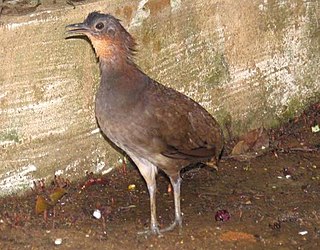 W
WThe Brazilian tinamou is a type of tinamou found in tropical moist lowland forest in regions of Amazonian South America.
 W
WThe brown tinamou is a brownish ground bird found in humid lowland and montane forest in tropical and subtropical South America.
 W
WThe Chinese bamboo partridge is a small Galliform bird. It is one of two species in the genus Bambusicola, along with the mountain bamboo partridge of the Himalayas. Long believed to be a relative of Perdix, scientists established that bamboo partridge are close relatives of the long-billed partridge and junglefowl.
 W
WThe collared flycatcher is a small passerine bird in the Old World flycatcher family, one of the four species of Western Palearctic black-and-white flycatchers. It breeds in southeast Europe and Eastern France to the Balkan Peninsula and Ukraine and is migratory, wintering in sub Sahara Africa. It is a rare vagrant in western Europe.
 W
WThe double-banded sandgrouse is a species of ground-living bird in the family Pteroclidae. It is found in arid parts of southern Africa.
 W
WThe dusky-legged guan is a species of bird in the family Cracidae, the chachalacas, guans, and curassows. It is found in Uruguay, northeastern Argentina and southernmost areas of Paraguay and Brazil; a narrow disjunct range is in northern Argentina extending into south-central Bolivia.
 W
WThe dwarf tinamou also known as the least tinamou, is a small, superficially partridge-like bird with short tail and wings.
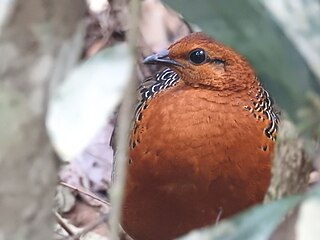 W
WThe ferruginous partridge is a species of bird in the family Phasianidae. It belongs to the monotypical genus Caloperdix. It is found in Indonesia, Malaysia, Myanmar, and Thailand.
 W
WThe four-banded sandgrouse is a medium-sized bird in the sandgrouse family.
 W
WThe golden-breasted bunting is a passerine bird in the bunting family Emberizidae. It occurs in dry open woodlands and moist savanna in Africa south of the Sahara, but is absent from the equatorial forest belt.
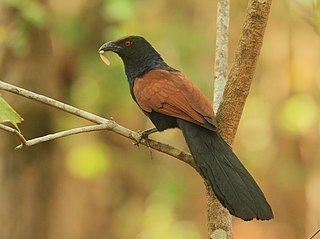 W
WThe greater coucal or crow pheasant, is a large non-parasitic member of the cuckoo order of birds, the Cuculiformes. A widespread resident in the Indian Subcontinent and Southeast Asia, it is divided into several subspecies, some being treated as full species. They are large, crow-like with a long tail and coppery brown wings and found in a wide range of habitats from jungle to cultivation and urban gardens. They are weak fliers, and are often seen clambering about in vegetation or walking on the ground as they forage for insects, eggs and nestlings of other birds. They have a familiar deep resonant call which is associated with omens in many parts of its range.
 W
WThe green catbird is a species of bowerbird found in subtropical forests along the east coast of Australia, from southeastern Queensland to southern New South Wales. It is named for its distinctive call which sounds like a cat meowing, although it has also been mistaken for a crying child, or a scary vampire sound early in the morning. The green catbird resembles the spotted catbird, which is only found in an isolated population in Far North Queensland.
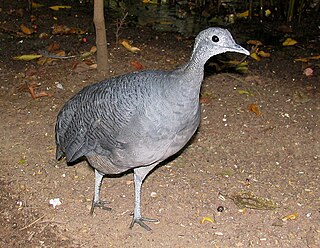 W
WThe grey tinamou is a type of ground bird native to South America. Four subspecies are recognised.
 W
WThe Hottentot buttonquail is a bird in the family Turnicidae formerly considered conspecific with the black-rumped buttonquail. As the word "Hottentot" is an offensive term for the Khoisan people, there are calls to re-evaluate the English name of this bird. Fynbos buttonquail would be a suitable alternative name for this habitat specialist.
 W
WKlaas's cuckoo is a species of cuckoo in the family Cuculidae which is native to the wooded regions of sub-Saharan Africa. The specific name honours Klaas, the Khoikhoi man who collected the type specimen.
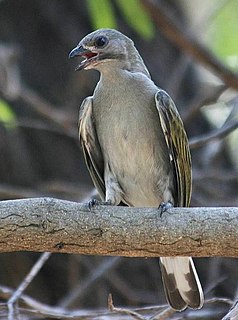 W
WThe lesser honeyguide is a species of bird in the family Indicatoridae.
 W
WThe long-billed partridge is a species of bird in the family Phasianidae.
 W
WThe mugimaki flycatcher is a small passerine bird of eastern Asia belonging to the genus Ficedula in the Old World flycatcher family, Muscicapidae. The name "mugimaki" comes from Japanese and means "wheat-sower". The bird is also known as the robin flycatcher.
 W
WThe Narina trogon is a largely green and red, medium-sized, bird of the family Trogonidae. It is native to forests and woodlands of the Afrotropics. Though it is the most widespread and catholic in habitat choice of the three Apaloderma species, their numbers are locally depleted due to deforestation. Some populations are sedentary while others undertake regular movements. The species name commemorates Narina, mistress of French ornithologist François Levaillant, whose name he derived from a Khoikhoi word for "flower", as her given name was difficult to pronounce.
 W
WThe pomarine jaeger, pomarine skua, or pomatorhine skua, is a seabird in the skua family Stercorariidae. It is a migrant, wintering at sea in the tropical oceans.
 W
WThe red-backed buttonquail is a species of bird in the family Turnicidae. It is found in Australia, Indonesia, Papua New Guinea, the Philippines and the Solomon Islands. Other names by which it is known in different parts of its range include black-backed, black-spotted and orange-breasted buttonquail. There are fourteen recognised subspecies.
 W
WThe red-chested cuckoo is a species of cuckoo in the family Cuculidae. It is a medium-sized bird found in Africa south of the Sahara. In Afrikaans, it is known as "Piet-my-vrou", after its call.
 W
WThe red-winged tinamou is a medium-sized ground-living bird from central and eastern South America. Other common names for the species include perdiz grande, rufous tinamou, and ynambu.
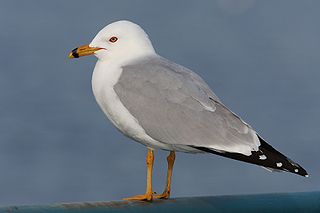 W
WThe ring-billed gull is a medium-sized gull. The genus name is from Latin Larus which appears to have referred to a gull or other large seabird. The specific delawarensis refers to the Delaware River.
 W
WThe rusty-margined guan is a species of bird in the family Cracidae, which includes the chachalacas, guans, and curassows. It is found in the dry regions of northeast Brazil, the cerrado and caatinga, as well as southeast Brazil; also the pantanal and the adjacent southeast Amazon Basin. It is also found in eastern Paraguay with extreme northeast Argentina, and eastern Bolivia in the Pantanal. Its natural habitats are subtropical or tropical moist lowland forest and subtropical or tropical dry shrubland. If not hunted, it tolerates human proximity well and can be found even in the city of Rio de Janeiro, in places such as the Rio de Janeiro Botanical Garden as well as in the adjoining Tijuca Forest.
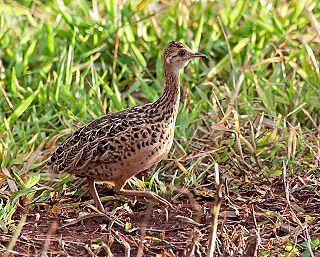 W
WThe spotted nothura is a species of tinamou. This bird is native to grassy habitats in eastern and southern Brazil, Paraguay, Uruguay, and eastern and northern Argentina.
 W
WThe swamp francolin, also called swamp partridge, is a partridge species native to the foothills of the Himalayas in northern India and Nepal. It is considered extinct in the Ganges-Brahmaputra delta in Bangladesh. It is listed as Vulnerable on the IUCN Red List.
 W
WThe Tataupa tinamou is a type of tinamou commonly found in dry forest in subtropical and tropical regions in southeastern South America.
 W
WThe tundra swan is a small Holarctic swan. The two taxa within it are usually regarded as conspecific, but are also sometimes split into two species: Bewick's swan of the Palaearctic and the whistling swan proper of the Nearctic. Birds from eastern Russia are sometimes separated as the subspecies C. c. jankowskii, but this is not widely accepted as distinct, with most authors including them in C. c. bewickii. Tundra swans are sometimes separated in the subgenus Olor together with the other Arctic swan species.
 W
WThe undulated tinamou is a species of ground bird found in a wide range of wooded habitats in eastern and northern South America.
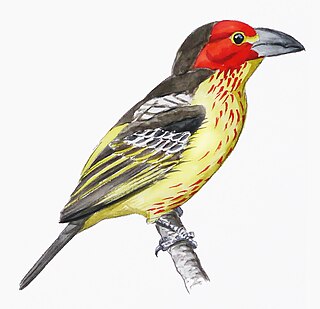 W
WVieillot's barbet is a small African barbet. Barbets and toucans are a group of near passerine birds with a world-wide tropical distribution. The barbets get their name from the bristles which fringe their heavy bills. This bird is named after the French ornithologist Louis Jean Pierre Vieillot.
 W
WThe white-crested laughingthrush is a member of the family Leiothrichidae. It is a highly social and vocal bird found in forest and scrub from the Himalayan foothills to Southeast Asia.
 W
WThe white-winged tern, or white-winged black tern, is a species of tern in the family Laridae. It is a small species generally found in or near bodies of fresh water across much of the world, including Europe, Africa, Asia, and Australia. The genus name is from Ancient Greek khelidonios, "swallow-like", from khelidon, "swallow".